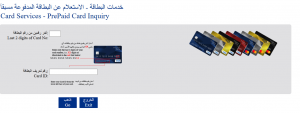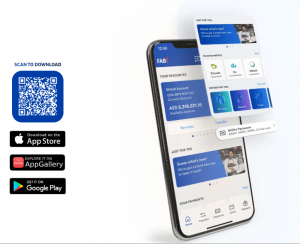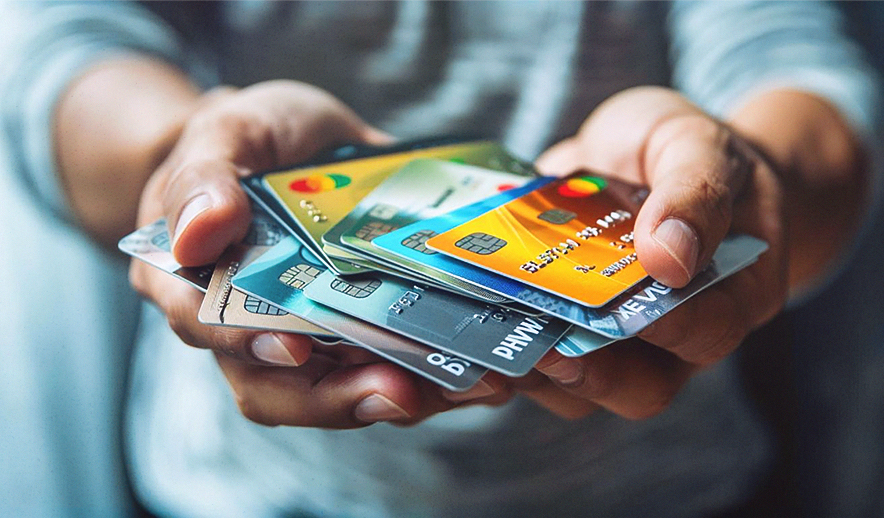This composition will guide you on how to perform FAB bank balance enquiry. FAB offers its customers seamless and accessible options for FAB bank balance check, by reaching the client care center, branches, ATMs or performing FAB bank balance enquiry online using online banking, mobile app. and so on
FAB accounts offers you the right fit for your financial requirements. With different type of account options available, First Abu Dhabi Bank balance enquiry is one of the top queries for customers. As one of the most trusted banks in the UAE, First Abu Dhabi Bank( FAB) encompasses a complete array of personal finance products such as credit cards, loans and bank accounts. FAB’s savings accounts and current accounts are relatively popular. FAB also often promote products along with CASA ( Current Account and Savings Accounts) accounts.
FAB Mobile allows access to accounts at any time and from any place, making it easier to manage your finance on the go.
FAB balance check is an online and offline service that lets you view your account balance and the history of the transactions done. This is an effective way to keep a check on what is coming in and going out of your FAB bank account. When you check FAB balance, you get real- time updates that help you manage your finances more.
What’s FAB Balance Check?
While opening a FAB bank account gives one a flawless banking experience and prices; effective operation of finances starts with knowing the current balances in your account. There are multiple ways one can check the balance on their FAB accounts.
Why should you check your FAB balance?
Checking your account balance is an essential habit for managing your finances. It helps cover spending, keep track of income deposits, and know whether there is enough funds in the account for bills, purchases, or emergency situations.
Regular checking of balances can also avoid overdraft, decline transactions, and missed payments and help you avoid minimal balance conditions that attract penalties. It promotes mindfulness in terms of your spending patterns and teaches you to be more disciplined.
In addition, frequent checks enable you to find unauthorized or fraudulent events, therefore adding security for your finances. With knowledge of the balance, it’s easier to plan for expenses, subscriptions, and prepare for surprise charges, leading to better financial stability and peace of mind.
FAB Balance Check options
To check your First Abu Dhabi Bank (FAB) balance, you can use the FAB Bank balance enquiry service through their online banking portal or mobile app. Simply log in to your account to perform a FAB Bank balance check online and access your account details quickly and securely.

FAB Bank Balance Enquiry via Mobile App (Online Check)
The FAB Mobile App makes managing your finances convenient and secure from your mobile device. With its user-friendly interface and robust security, users of iOS and Android devices can easily handle their accounts.

Step 1: Download the FAB Mobile App
- Visit the App Store (iOS) or Google Play Store (Android) and search for the FAB Mobile Banking App.
- Locate the download section and install the app on your device.
Step 2: Log In to Your Mobile Banking Account
- Enter your Username and Password to log in.
- If you’re a new user, you can register directly through the app to start using it.
Step 3: Perform a FAB Balance Check
- Once logged in, go to the ‘Accounts’ tab on the home page.
- Here, you can conduct a FAB bank balance check, view your account summary, recent transactions, and download statements.
Additional Features for First Abu Dhabi Bank Balance Enquiry
- Quick Balance Check : Use the FAB bank balance enquiry feature to view your balance instantly, even without logging in, depending on your app version.
- Push Notifications : Stay updated with real-time alerts for account activity, including any FAB bank balance check online or transactions.
- Mobile Payments: Seamlessly transfer funds, pay bills, and manage other financial transactions.
With the FAB Mobile App, conducting a First Abu Dhabi Bank balance enquiry or managing your finances is simpler, faster, and more secure.
How to Perform FAB Bank Balance Check Online with Internet Banking?
FAB’s online banking platform offers a flawless and secure way to check your account balance anytime, anywhere. With just a few clicks, guests can log in to their FAB online banking gate and view their account details, including real- time balance updates. Accessible via the sanctioned FAB website, this platform provides a comprehensive overview of all your FAB accounts in one place, making it accessible to track and manage your finances efficiently. Whether you’re at home or in the office, online banking ensures that your fiscal information is always at your fingertips.
Using online banking for FAB bank balance checks online has several advantages over other channels. It provides 24/7 availability, allowing you to check your balance at your convenience, unlike branch visits or client care centers that work during specific hours. The platform also enables you to perform multiple tasks in one session, similar as reviewing deals, transferring finances, and paying bills, streamlining your banking experience. Compared to mobile apps, online banking often offers a broader view of account exertion on larger defenses, enhancing usability. The security measures with OTPs and translated connections mean that your information is safe and private. FAB’s online banking is a sure, friendly, and secure platform for managing one’s finances and is an effective tool.
Follow this way to produce a new login id and password.
- Visit the sanctioned FAB website at www.bankfab.com, click on” Log in”, and select Online Banking( UAE).
- Enter your client ID number, disbenefit card number, or credit card number.
- Input the One-Time password( OTP)
- 3 integers transferred to your registered mobile number.
- 3 integers transferred to your registered dispatch address in a word- defended PDF attachment.
- Produce an innovative word to complete the process.
FAB bank balance check enquiry through ATM
To check your First Abu Dhabi Bank (FAB) account balance at an ATM, you will need to follow these steps:
Steps for FAB Balance check enquiry on an ATM :
- Locate a FAB ATM : Find the nearest FAB ATM. If you are not near a FAB ATM, you can use any ATM that supports your debit card network (e.g., Visa, Mastercard).
- Insert Your Debit/ATM Card : Insert your FAB debit or ATM card into the ATM machine.
- Select Your Language : Choose your preferred language (e.g., English, Arabic).
- Enter Your PIN: Input the **Personal Identification Number (PIN)** associated with your FAB credit card.
- Choose the “Balance Inquiry” Option : Once logged in, navigate to the **Balance Inquiry** option on the menu.
- Depending on the ATM, it might also be listed under options like Account Information or Check Balance.
- Check or Print Your Balance :
- The ATM will print your account balance on the screen.
- You may also pick to **print a receipt**, if available.
- End Transaction and Take Your Card: Make sure you close the session and withdraw your card from the machine.
Tips:
- Use FAB ATMs to get free balance inquiries. Other banks’ ATMs will charge a small fee.
- If you have more than one account associated with your card, make sure you choose the right account (e.g., savings, current).
- Always cover your PIN when you are entering it to secure it.
If you face any problem, then you can call FAB customer care at **600 52 5500** within UAE.
FAB Balance Check enquiry through Bank Visit
Branch visit serves as the oldest and most traditional way for customers of First Abu Dhabi Bank (FAB) to check account balances. For FAB, visiting a FAB branch means talking to a banking representative in real-time for actual account information and other queries. This method is best suited for those who value personalized interaction or need help with other services in addition to their balance inquiry. However, branch visits can be time-consuming, and customers must follow the operating hours of the branches, which makes this choice less convenient for busy people. One can search for the branches in FAB branch locator.
Comparison with Other Channels
With respect to branch visits that provide face-to-face banking services, FAB offers various alternatives in digital and self-service in FAB balance checks that will surely fit the preference of modern savvy and busy consumers. FAB Mobile Banking allows users to easily access their balances anytime and from anywhere for greater convenience. These electronic channels are right for customers who are comfortable with technology because they decrease the need to visit a branch.
For those who prefer face-to-face interaction but cannot visit a branch, FAB’s customer care services have balance inquiries via the telephone. Furthermore, ATMs are fast and accessible as a self-service channel that enables balance checks as well as other simple transactions. Compared to branch visits, these alternate channels are in general faster and more accessible while available 24/7, hence preferred for all routine banking.
FAB Balance Check enquiry through Customer Care Contact Center
First Abu Dhabi Bank offers the convenience of checking account balances through its customer care contact center.
First, by calling the dedicated number for customer service ( as given on the table below) , account holders can inquire about the balance after proper verification on security checks that include personal details or a PIN on phone banking. This channel is recommended for customers without any electronic resources such as smartphone devices or internet. Customer care provides one-stop aid for banking requirements. Although this service is dependable, it certainly has some drawbacks such as long queues during peak hours, elaborate verification questions etc. Additionally, due to higher call volumes during public holidays or emergencies, customers may face difficulties in getting through the call center.
Below are some of the important numbers for FAB customer care.
|
Customer |
UAE |
International |
|
Personal Customers |
600525500 | +971 2 681 1511 |
| Elite | 80040000 | |
|
Private Banking |
80040000 | +971 2 499 6599 |
|
Business Banking |
600522235 | |
| Ratibi | 600522298 | |
| Payit | 600543329 | |
| POS | 02 4104888 | |
| FAB Islamic | 8002200 |
Why Digital Mediums such as Online banking or Mobile App a better choice for FAB balance check?
These platforms provide 24/7 access to account information without the need to interact with customer care agents. Customers can log in securely and view real-time updates of their account balances in seconds. Additionally, these platforms often offer a host of other self-service features such as fund transfers, bill payments, and transaction history, making them more versatile and efficient.
Digital channels also support the expectations of today’s customers to receive immediate and hassle-free service. They minimize dependence on phone lines and are less likely to be affected by delays or inaccessibility. However, the customer should have a reliable internet connection and guard their login details. Digital banking is not only making everyday banking easier but also part of the larger trend toward more environmentally friendly, paperless banking.
Top Services Offered by FAB ( First Abu Dhabi Bank)
First Abu Dhabi Bank (FAB) is one of the UAE’s most trusted financial institutions, offering a wide range of banking products and services for individuals, businesses, and investors. With both conventional and Islamic banking options, FAB provides innovative solutions to meet diverse financial needs. Whether you are looking to perform a FAB balance check, manage your accounts, or explore investment opportunities, FAB provides a secure and convenient service at every step for its customers.
- Personal Banking – Conventional & Islamic banking products: From checking your FAB bank balance to exploring loans, credit cards and investments, FAB has you covered.
- Bank Accounts: Current & Savings Accounts: Choose from a range of conventional or Shariah-compliant accounts with attractive features. Easily open a FAB bank account and perform FAB bank balance enquiry online or via the mobile app.
- Time Deposits or Fixed Deposits: Secure your savings with competitive interest rates and flexible tenures.
- Loans & Financing: Personal Loans and Islamic finance : Access funds as a personal loan with competitive interest/ profit rates and flexible repayment options.
- Home Loans & Islamic Home Finance: Tailored mortgage solutions for property buyers : Car Loans & Islamic Car Finance: FAB offers both conventional and Islamic financing options for vehicle purchase.
- Credit Cards: FAB offers a variety of interesting credit cards with attractive loyalty rewards such as cashback, airmiles and reward points. These credit cards are loaded with benefits and value. Some favorites are listed below:
FAB Cashback Credit Card: You can earn cashback on every transaction that you spend on your credit card.
FAB Platinum & Signature Cards: Credit cards that offer travel-related rewards and value such as hotel discounts, airport lounge benefits, airport transfers etc.)
- Investments & Wealth Management Solutions : Mutual Funds & Portfolio Management: FAB provides expert-managed services to grow wealth through its mutual fund and portfolio management services.
- Islamic Investments: FAB also offers investment options aligned with Shariah principles.
- Insurance Products: Life, Health, and Travel Insurance: Comprehensive coverage for your peace of mind.
- Takaful Insurance: Shariah-compliant insurance for individuals and families.
- Corporate & Commercial Banking: FAB supports businesses of all sizes with tailored financial solutions, from startups to large corporations.
- Business Accounts & Corporate Financing: Customized financial support for growth.
- Trade Finance & Working Capital Solutions: Streamline global trade operations.
- Cash Management & Treasury Solutions: Tools to manage liquidity and risk effectively.
- Islamic Corporate Banking: Shariah-compliant services for corporate clients.
- Investment Banking
FAB’s investment banking division provides strategic advisory and capital market expertise.
Mergers & Acquisitions Advisory: Expert guidance on corporate deals and restructuring.
Debt & Equity Capital Markets: Assistance with IPOs, bonds, and sukuk issuance.
Structured Finance & Asset Management: Customized investment and funding solutions.
- Private Banking – Wealth & Asset Management
FAB Private Banking offers personalized services for high-net-worth individuals, focusing on wealth preservation and growth.
Personalized Wealth Advisory: Tailored investment strategies to secure and grow your wealth.
Asset & Portfolio Management: Access to global markets and alternative investments.
Estate & Succession Planning: Ensure seamless wealth transfer for future generations.
Why FAB?
Innovative Digital Banking: Easily perform a FAB bank balance check online, manage accounts, and invest through FAB’s digital platforms.
Shariah-Compliant Solutions: A wide range of Islamic banking options for individuals and businesses.
Global Reach & Expertise: A leading financial institution with a strong regional and international presence.
Whether you need to conduct a First Abu Dhabi Bank balance enquiry, apply for a loan, or explore investment opportunities, FAB provides world-class financial services tailored to your needs. With FAB, managing your finances is simple, secure, and convenient.
FAQs on FAB Balance Checks
1.What’s FAB balance check?
FAB balance check enquiry is a service that lets guests view their account balance and sale history via FAB mobile app, online banking, ATMs, client care, or branch visits.
2.Why should I check my FAB account balance regularly?
Regular balance checks help cover spending, display unauthorized spend, avoid overdraft freights, and plan effectively.
3.What are the benefits of checking my balance through FAB’s digital channels?
Digital channels give real- time updates, 24/7 access, enhanced security, and offers features such as history, fund transfers, and bill payments.
4.Are there any charges for using FAB bank balance check services?
Checking your balance via the FAB mobile app, online banking, or FAB ATMs is free. Still, non-FAB ATMs might charge a figure.
5.How often can I check my FAB account balance?
There’s no restriction on the number of times you can check your balance using digital or ATM services.
6.How can I check my FAB balance through the mobile app?
Download the FAB mobile app, log in, and navigate to the “ Accounts ” section to view your balance.
7.Is the FAB mobile app secure for balance checks?
Yes, the app uses advanced encryption and multi-factor authentication to ensure your account information is safe.
8.What should I do if I face issues with the FAB mobile app?
Try reinstalling it. However, if the issue persists, contact FAB client care at 600525500, If the issue persists.
9.Can I check balances for multiple FAB accounts on the app?
Yes, the app displays all your linked FAB accounts under a single dashboard.
10.Where can I download the FAB mobile app?
You can download it from the Apple App Store, Google Play Store, or Huawei App Gallery.
11.How do I check my balance using FAB online banking?
Log in to FAB’s online banking gate, and your account balance will be displayed on the dashboard.
12.What if I forget my FAB online banking word?
Use the “ Forgot word ” option on the login runner to reset your word by entering your client ID and OTP.
13.Can I view my balance without logging in?
No, for security reasons, you must log in to pierce your balance and account details.
14.Is FAB online banking available 24/7?
Yes, you can access online banking at any time.
15.Do I need any special software to use FAB online banking?
No, it works on any standard web browser with an internet connection.
16.How can I check my FAB balance at an ATM?
Enter your FAB card, Enter your PIN, choose “ Balance Inquiry, ” and view your balance on the screen or publish a receipt.
17.Can I check my FAB balance at non-FAB ATMs?
Yes, but some non-FAB ATMs may charge a fee for balance inquiries.
18.What should I do if the ATM does not display my balance?
Make sure your card is active and functional. However, contact FAB client care, If, issues persist.
19.What’s the client care number for FAB balance inquiries?
Call 600525500 within the UAE or 971 2 681 1511 internationally.










